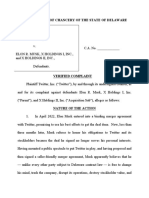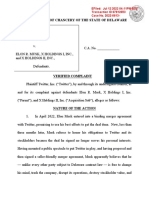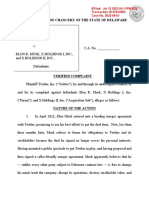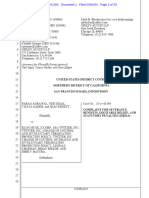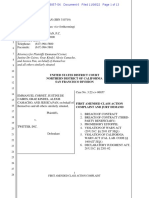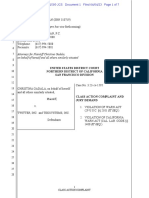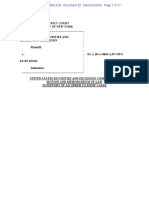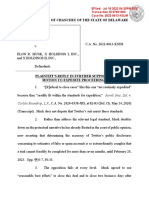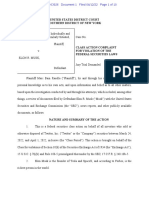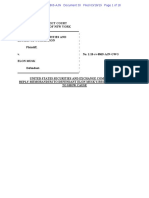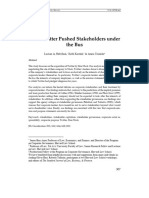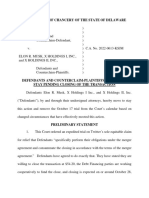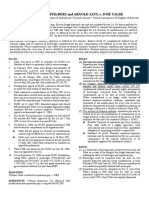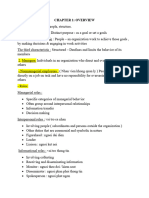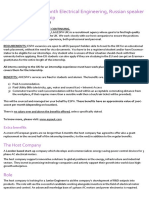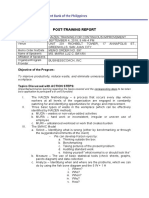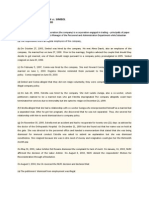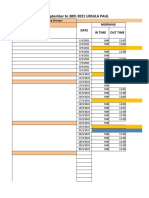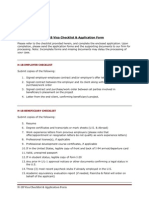ARBITRATION IN MERGERS AND ACQUISITION
A CASE STUDY OF ELON MUSK’S TWITTER TAKEOVER
By,
Mayank Sharma
LLB (HONS)
Admission Number:23242564
Enrollment Number: 230060201094
E-Mail: 230060201094.mayank@gdgu.org
1|Page
� Table Of Contents
Sr. No. Description Page No.
1 Introduction 3
TIMELINE OF EVENTS
2 5
Fabien Ho Ching Ma, et al. v. Twitter, Inc. (X Corp.)
3 8
Comparative Analysis of Arbitration Provisions: The
U.S. Federal Arbitration Act and the Indian Arbitration
and Conciliation Act in the Fabien Ho Ching Ma, et al.
v. Twitter, Inc. (X Corp.)
4 10
6 Conclusion 13
7 References 14
2|Page
� INTRODUCTION
Arbitration plays an important role in resolving disputes related to mergers and acquisitions
(M&A), especially in complex transactions involving multiple parties and intricate
agreements. This makes disputes almost inevitable at some stage of the transaction. These
disagreements can take place before and after the closing of the deal and they can be
regarding many issues like due diligence, price adjustments or breaches of warranties.
Arbitration is the method preferred for settling these disputes because it offers flexibility,
speed, and neutrality.
In the pre-closing phase, disputes usually arise over matters like due diligence or breaches of
warranties. This stage is prone to disputes because the parties involved make promises about
the business being sold, its finances, assets, liabilities, and pending litigation if any. If a
disagreement arises during this time, arbitration can provide for a faster and more efficient
dispute resolution which in turn allows for the deal to move ahead in a proper manner without
the long delays associated with litigation. Some examples of Pre-closing arbitration are
concerns over financing, agreement validity, and regulatory compliance.
Post-closing disputes are issues like purchase price adjustments or breaches of
representations and warranties. Example: a disagreement might arise if one party claims that
the company acquired misrepresented it's financial health at the time of acquisition. Parties
can appoint arbitrators with expertise in either valuation or accounting to handle complex
financial disagreements while offering specialized knowledge that isn't always available in a
courtroom. This expertise is valuable when resolving disputes requiring a deep understanding
of technical details.
One M&A example is Elon Musk's acquisition of Twitter in 2022. Though initially it
appeared to be a straightforward deal, Musk's attempt to back out of the $44 billion purchase
over concerns about Twitter's spam accounts sparked legal battles. Twitter sought to compel
Musk to complete the acquisition through litigation rather than arbitration 1. Even though the
case did not proceed through arbitration, it shows how arbitration could have provided a more
efficient and private resolution pathway. The publicity of litigation could have been avoided
1
Verified Complaint, Twitter, Inc. v. Elon R. Musk, C.A. No. 2022-0613- (Del. Ch. July 12, 2022).
3|Page
�through arbitration, where confidentiality and neutrality could have protected both parties'
interests.
After Elon Musk's acquisition, new disputes emerged with former Twitter employees who
had been laid off as part of Musk's restructuring efforts of the company which led to over
2,000 ex-employees-initiated arbitration claims against Twitter 2, alleging wrongful
termination, violation of labor laws like the WARN Act 3, and failure to pay severance. In
response, Twitter (under Musk's ownership) sought to avoid arbitration by refusing to pay the
required arbitration fees under JAMS rules. This led to legal actions where the ex-employees
filed petitions to compel Twitter to proceed with arbitration. The arbitration clause in their
employment agreements became a critical point of contention, and Twitter's refusal to honor
the agreement not only delayed the arbitration but also highlighted the financial and
procedural burdens employees face when employers attempt to circumvent arbitration
obligations.
This post-acquisition case demonstrates how arbitration, while generally more efficient than
litigation, can be misused if parties refuse to comply with procedural obligations. In the U.S.,
under the Federal Arbitration Act (FAA)4, courts have the authority to compel arbitration
when one party refuses to proceed under a valid arbitration agreement.
2
Petition to Compel Arbitration, Fabien Ho Ching Ma v. Twitter, Inc., No. 3:23-cv-3301 (N.D. Cal. July 3,
2023).
3
Worker Adjustment and Retraining Notification Act, 29 U.S.C. §§ 2101-2109 (1988).
4
Federal Arbitration Act, 9 U.S.C. §§ 1-14 (1925).
4|Page
� TIMELINE OF EVENTS
January 2022:
Elon Musk begins quietly purchasing shares of Twitter, eventually accumulating a
stake of around 5% by mid-March 2022.
April 4, 2022:
Musk publicly discloses his 9.1% stake in Twitter, becoming the company's largest
shareholder. Twitter's stock sees a significant rise following the announcement.
April 5, 2022:
Twitter offers Musk a seat on its board, which he initially accepts.
April 9, 2022:
Musk reverses his decision and declines the board seat, signaling a bigger move may
be on the horizon.
April 14, 2022:
Musk announces an offer to buy Twitter outright for $54.20 per share, valuing the
company at approximately $44 billion. He frames the offer as his "best and final"
proposal.
April 25, 2022:
Twitter's board agrees to Musk's offer, accepting the terms of the acquisition deal. The
5|Page
� agreement contains no due diligence or financing contingencies.
May 13, 2022:
Musk tweets that the deal is "temporarily on hold," due to concerns over the number
of spam or bot accounts on Twitter's platform. Twitter maintains that the deal is still
valid and moving forward.
July 8, 2022:
Musk attempts to back out of the deal, officially notifying Twitter of his intention to
terminate the acquisition agreement, citing alleged misrepresentation of the number of
spam accounts.
July 12, 2022:
Twitter files a lawsuit in the Delaware Court of Chancery to compel Musk to
complete the acquisition, accusing him of acting in bad faith and seeking specific
performance to enforce the agreement.
October 4, 2022:
Musk reverses his position and offers to proceed with the acquisition on the original
terms, days before the trial is set to begin.
October 27, 2022:
Elon Musk officially completes the acquisition of Twitter for $44 billion. He
immediately begins restructuring the company, including massive layoffs.
November 2022:
Musk initiates mass layoffs at Twitter, terminating over 75% of the company's
6|Page
� workforce. Laid-off employees allege violations of the WARN Act and file claims
related to unpaid severance and wrongful termination.
2023 (Post-Acquisition Arbitration Case):
Approximately 2,000 former Twitter employees file individual arbitration claims,
citing wrongful termination, violations of labor laws, and breach of contractual
agreements on severance pay. Under JAMS arbitration rules, Twitter is required to
cover the arbitration costs. However, in June 2023, Twitter, under Musk's leadership,
refuses to pay the required arbitration fees, effectively stalling the process.
June 2023:
Ex-employees file petitions to compel Twitter to proceed with the arbitration, citing
the refusal to pay arbitration fees as a violation of their employment contracts. These
legal actions highlight the post-acquisition challenges Twitter faces, with Musk's
management attempting to avoid arbitration costs.
7|Page
� Fabien Ho Ching Ma, et al. v. Twitter, Inc. (X Corp.)
Following the acquisition of Twitter, the company saw a series of drastic layoffs resulting in
more than 75% of Twitter’s workforce being terminated. The former employees that had been
terminated, alleged violations of various laws, including:
breaches of the contractual obligations related to severance pay
violations of the WARN Act
discrimination based on race, sex, age, and disability.
Many of the terminated employees had signed arbitration agreements that stated that any
disputes arising from their employment would be resolved through arbitration under JAMS
rules.
Twitter, prior to the acquisition, had successfully moved to compel arbitration in class-action
lawsuits, compelling employees to arbitrate their claims as opposed to litigating them in
court. The arbitration agreements specified that arbitration would be conducted under JAMS
rules, which required Twitter to bear the majority of the arbitration costs, including arbitrator
fees.
As the case filings state: “JAMS rules require the employer to pay all arbitration fees,
including the arbitrator’s costs, except for an initial filing fee paid by the employee”. These
arbitration agreements, which were mandatory and signed as a condition of employment had
left little room for employees to pursue claims through public courts.
The primary issue arose when Twitter, under Musk’s ownership, reversed its initial stance
and refused to cover the arbitration fees required by JAMS. In June 2023, Twitter sent a letter
to JAMS requesting that arbitration fees be split equally between the company and the former
employees, directly contradicting the JAMS Minimum Standards for employment disputes.
JAMS immediately rejected this and reiterated that Twitter was in obligation to cover the full
arbitration fees as per its agreement and the Minimum Standards.
8|Page
�JAMS responded by stating that it would not proceed with any arbitration cases where
Twitter refused to comply with the Minimum Standards, effectively putting the arbitration
process on hold. In response to the developments Fabien Ho Ching Ma and the other former
employees filed a petition to compel arbitration in the Northern District of California. The
petition sought a court order forcing Twitter to honour its arbitration agreements and pay the
necessary fees so the arbitration process could move forward.
The complaint explicitly states that “by refusing to abide by the JAMS Minimum Standards
and pay the full arbitrator fees as required by those standards, Twitter has interfered with
Petitioner and other employees’ right to arbitrate their claims”. Due to non-compliance with
its own arbitration agreements delayed the arbitration proceedings, created an additional
financial burden on the laid-off employees
This case highlights the difference between the theoretical benefits of arbitration like
efficiency, confidentiality, cost-effectiveness with the practical difficulties that arise when
any one-party refuses to comply with the agreed-upon terms. While arbitration can be seen as
a streamlined and less costly alternative to litigation this case illustrates how the refusal of a
corporation to adhere to arbitration obligations can stall the process and increase costs for the
more vulnerable party.
Under U.S. law, specifically the Federal Arbitration Act (FAA), Section 4, courts can
intervene to compel arbitration when one party refuses to comply with the arbitration
agreement. This provision was the basis for the former employees’ petition.
This case is an example of how arbitration by design is to be fair and efficient, it can be
undermined if the more powerful party refuses to fulfil its financial obligations under the
arbitration framework. It also highlights the importance of judicial oversight in ensuring that
arbitration remains a viable and effective means of dispute resolution. If big and powerful
companies are allowed to compel arbitration but then refuse to pay the associated costs, the
integrity of the arbitration process is jeopardized.
9|Page
� Comparative Analysis of Arbitration Provisions: The U.S. Federal
Arbitration Act and the Indian Arbitration and Conciliation Act in the
Fabien Ho Ching Ma, et al. v. Twitter, Inc. (X Corp.)
Section 2 (FAA): Validity, irrevocability, and enforcement of agreements to
arbitrate": A written provision in any maritime transaction or a contract evidencing a
transaction involving commerce to settle by arbitration a controversy thereafter
arising out of such contract or transaction, or the refusal to perform the whole or any
part thereof, or an agreement in writing to submit to arbitration an existing
controversy arising out of such a contract, transaction, or refusal, shall be valid,
irrevocable, and enforceable, save upon such grounds as exist at law or in equity for
the revocation of any contract."5
This section establishes the enforceability of arbitration agreements and was central to the ex-
Twitter employees' case to compel arbitration.
Section 4 (FAA): Failure to arbitrate under agreement; petition to United States
court to compel arbitration": A party aggrieved by the alleged failure, neglect, or
refusal of another to arbitrate under a written agreement for arbitration may petition
any United States district court... for an order directing that such arbitration proceed in
the manner provided for in such agreement."6
This provision allowed the ex-Twitter employees to file a petition to compel Twitter to
proceed with arbitration after the company refused to pay JAMS arbitration fees.
Section 10 (FAA): Grounds for vacating an award: "In any of the following cases,
the United States court in and for the district wherein the award was made may make
an order vacating the award upon the application of any party to the arbitration—(1)
where the award was procured by corruption, fraud, or undue means; (2) where there
5
Federal Arbitration Act, 9 U.S.C. § 2 (1925).
6
Federal Arbitration Act, 9 U.S.C. § 4 (1925).
10 | P a g e
� was evident partiality or corruption in the arbitrators, or either of them; (3) where the
arbitrators were guilty of misconduct in refusing to postpone the hearing, upon
sufficient cause shown, or in refusing to hear evidence pertinent and material to the
controversy; or of any other misbehavior by which the rights of any party have been
prejudiced; or (4) where the arbitrators exceeded their powers, or so imperfectly
executed them that a mutual, final, and definite award upon the subject matter
submitted was not made."7
This section serves as a safeguard in case of improper conduct during arbitration.
Corresponding Indian Provisions (Arbitration and Conciliation Act, 1996)
Section 7 (Indian Act): Arbitration agreement
"(1) In this Part, “arbitration agreement” means an agreement by the parties to submit to
arbitration all or certain disputes which have arisen or which may arise between them in
respect of a defined legal relationship, whether contractual or not.
(2) An arbitration agreement may be in the form of an arbitration clause in a contract or in the
form of a separate agreement.
(3) An arbitration agreement shall be in writing."8
This section mirrors FAA’s Section 2 and ensures that arbitration agreements in India are
legally valid and enforceable, just like in the U.S.
Section 8 (Indian Act): Power to refer parties to arbitration where there is an arbitration
agreement: "(1) A judicial authority before which an action is brought in a matter which is
the subject of an arbitration agreement shall, if a party to the arbitration agreement or any
person claiming through or under him, so applies not later than the date of submitting his first
statement on the substance of the dispute, then, notwithstanding any judgment, decree or
order of the Supreme Court or any court, refer the parties to arbitration unless it finds that
prima facie no valid arbitration agreement exists.
7
Federal Arbitration Act, 9 U.S.C. § 10 (1925).
8
The Arbitration and Conciliation Act, No. 26 of 1996, § 7, India Code (1996).
11 | P a g e
�(2) The application referred to in sub-section (1) shall not be entertained unless it is
accompanied by the original arbitration agreement or a duly certified copy thereof." 9
This section, similar to FAA’s Section 4, allows Indian courts to refer parties to arbitration
when a valid arbitration agreement exists, ensuring the enforcement of such agreements in
Indian disputes.
Section 34 (Indian Act): Application for setting aside arbitral awards: "(1) Recourse
to a Court against an arbitral award may be made only by an application for setting
aside such award in accordance with sub-section (2) and sub-section (3).
(2) An arbitral award may be set aside by the Court only if—
(a) the party making the application furnishes proof that—
(i) a party was under some incapacity; or
(ii) the arbitration agreement is not valid under the law to which the parties have
subjected it or, failing any indication thereon, under the law for the time being in
force; or
(iii) the party making the application was not given proper notice of the appointment
of an arbitrator or of the arbitral proceedings or was otherwise unable to present his
case; or
(iv) the arbitral award deals with a dispute not contemplated by or not falling within
the terms of the submission to arbitration, or it contains decisions on matters beyond
the scope of the submission to arbitration."10
Like Section 10 of the FAA, Section 34 provides Indian courts with the authority to set aside
arbitral awards on grounds such as misconduct, lack of jurisdiction, or procedural defects.
9
The Arbitration and Conciliation Act, No. 26 of 1996, § 8, India Code (1996).
10
The Arbitration and Conciliation Act, No. 26 of 1996, § 34, India Code (1996).
12 | P a g e
� CONCLUSION
Arbitration can be an effective way to handle complex disputes, especially in corporate
settings like the case of Fabien Ho Ching Ma, et al. v. Twitter, Inc. (X Corp.) after Elon
Musk's acquisition. The flexibility, confidentiality, and speed of arbitration make it a strong
alternative to going to court, particularly when time and cost are crucial. A key benefit of
arbitration is that it allows the parties involved to choose arbitrators with expertise in
specialized areas, doing so is useful for cases involving technical or financial issues like
severance packages or purchase price adjustments. Arbitration also offers privacy, helping to
keep sensitive information out of the public eye.
Arbitration isn’t without its downsides. In the Twitter case, the process was stalled when one
party failed to meet its obligations, like paying arbitration fees which can put a financial
strain on the less powerful party and lead to delays. This exposes a major weakness in the
system when one side tries to shirk its responsibilities. While arbitration can be quicker than
court proceedings, it can still become expensive, especially when factoring in the cost of
arbitrators and handling procedural challenges.
13 | P a g e
� REFERENCES
M&A Arbitration Insights
Bernd D. Ehle, Arbitration as a Dispute Resolution Mechanism in Mergers and
Acquisitions, in Comparative Law Yearbook of International Business 288, 288-91
(2001).
Cross-Border Arbitration in M&A
Layan Al Fatayri, Arbitration in Cross-Border Mergers and Acquisition
Transactions: An Advantage?, Aria (Columbia Law School) (2020).
M&A in International Arbitration: Indian Perspective
Shardul Amarchand Mangaldas & Co, M&A in International Arbitration: An Indian
Perspective (2020).
14 | P a g e

